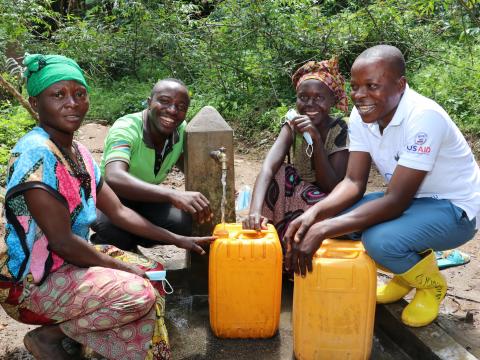Clean water strengthens social cohesion between households in Kalehe

By Vedella Rutaha - SBCC and Senior Media Officer
Norbert Nsibula is 28 years old and a father of one. Unlike most men in his community, he tirelessly ferries potable water from the water point to his home for household needs, as well as to monitor the cleanliness of the water point not far from his house. He is president of the Burhesa Water Point Management Committee (COGEP).
Living in Tchibanja village in the health area of Kalehe-Centre, Norbert is motivated by the reduction of waterborne diseases that plagued his community and snatched children's lives in previous years. The community of Burhesa used to draw water from the Kajabwe spring, 4 kilometres from this sub-village. Safe drinking water, which was essential for household chores, was inaccessible, leading to the use of river water.
"My neighbour's wife even had an accident while she was looking for drinking water, and she sustained injuries that affected her household for two months", Norbert narrates."
As a community leader, Norbert took the courage to gather other members of the village on 15 May 2021, to think about how to get potable water to their village. "To motivate the eventual development partner, we all decided together to start contributing US$ 6 per head of household –called in our jargon Mushamuka– in order to be ready with our share of contribution in case of need."
In order to support the actions of Local Development Committees (LDCs), in 2021, the FSP-Enyanya Project (the South Kivu Food Security Project, implemented by Word Vision in Kalehe Territory and known locally as Enyanya), financed by USAID from 2016 to 2023, decided to co-finance micro-projects developed by these same committees to solve certain community problems.
Thus, after the advocacy of these community leaders through the LDC Chibanja, the sub-village of Burhesa has benefited from water catchment from the Kanyamahemba spring to serve more than 100 households. This was after an environmental assessment and water test was approved by the BCZ Central Office.
As the president of COGEP, Norbert showed his leadership by sensitising his community to participate in the installation of this water point. "With the agreement of the village chief, we organised another general assembly with the community to help them understand the spirit of participation in community projects", he says. The courageous man has received the endorsement from all to support this very commendable project.
Today, the community is relieved with the accessibility of clean water and the reduction of the distance its members used to have to travel to fetch drinking water. Norbert believes that community participation on this project has strengthened social cohesion.
"Our contribution was stones, sand, gravel, and labour to dig trenches for the piping and the construction of the fence to secure our water point", he explains with joy and quickly adds that household chores are now much easier to accomplish, including the watering of the kitchen gardens. He further observes that installation of the water point has also significantly reduced accidents and protection incidents that would occur on trips to and from the water point by households.
In order to manage this water source well, and to make sure that hygiene norms are respected, the management committee forbids drawing water with dirty containers or sending small children to work.
At present, the households that draw water from the fountain contribute CF 500 (US$ 0.5) per month to the maintenance fund, but also to set up a project to build other fountains in order to alleviate the costs of households that use them. The committee relies on various training courses on sustainable management of the works to establish its leadership.
In 2021, the FSP-Enyanya Project, through its Good Governance programme, supported LDCs in carrying out their socio-economic projects according to the priority needs of each community. In the same year, this programme installed five standpipes in four health areas in order to meet the urgent needs of the community and reduce the rate of waterborne diseases.
"The availability of clean water close to the households is a precious gift for the families and the whole community. I commit myself through advocacy and mobilisation to help other villages to access clean water", Norbert concludes.
The FSP-Enyanya Project supports USAID's strategic objectives for the Democratic Republic of Congo (DRC) by working with households, community leaders, and the DRC Government to improve the food and nutrition security and economic well-being of vulnerable households in South Kivu.